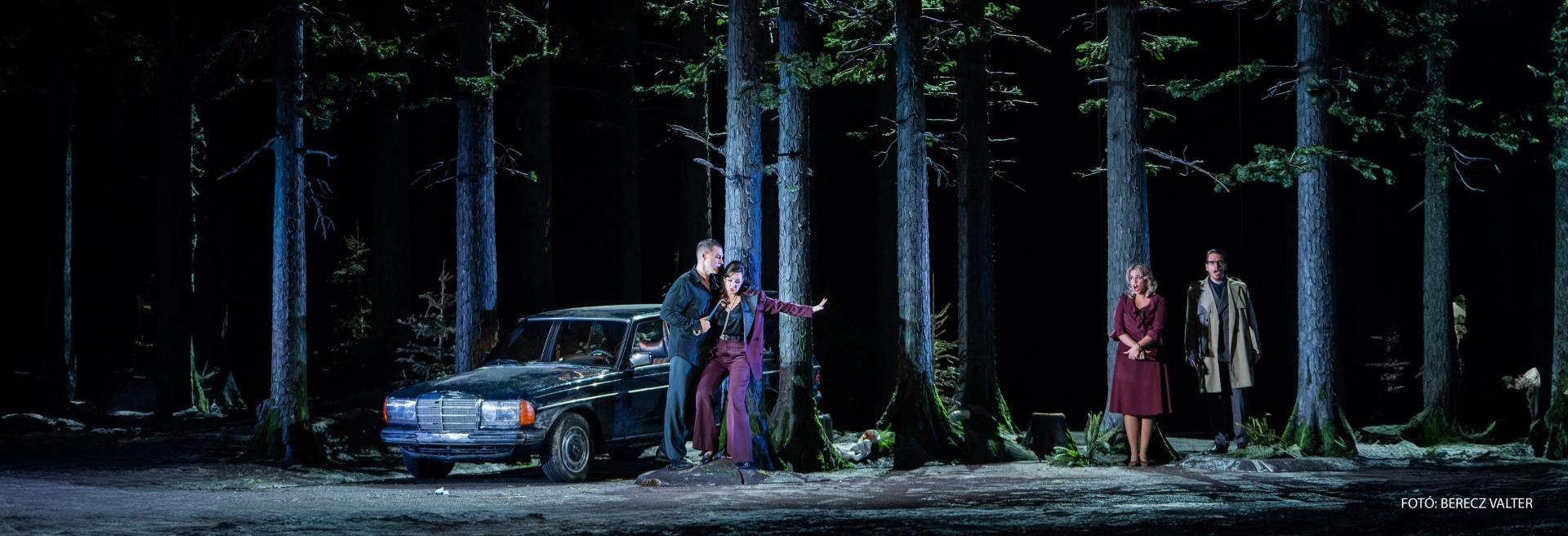Don Giovanni
Mo | Tu | We | Th | Fr | Sa | Su |
Don Giovanni – Wolfgang Amadeus Mozart
Dramma giocoso | Contemporary
Running time: 3 hours 30 minutes, including one interval
Language: Italian
Surtitles: Hungarian, English, Italian
There are works of art that are timeless, that you cannot get tired of, that cannot be performed too many times. Don Giovanni by Wolfgang Amadeus Mozart is no exception – it is no coincidence that it is known as the “opera of operas”. And some productions, even if they were staged several decades ago, are still relevant and worth revisiting. One such production is Don Giovanni, directed by Claus Guth for the 2008 Salzburg Festival, which has since been staged in Berlin, Madrid, Amsterdam – and will be performed not only at the Opéra Bastille in Paris but also at the Hungarian State Opera in the 2023/24 season. Claus Guth envisioned Don Giovanni in a forest. The forest has always been an inspiring setting for dramatic action, love, death, getting lost, fear, growing up – just think of A Midsummer Night's Dream, among many other folktales! Guth’s ever-rotating, terrifying yet wittily playful forest setting is less a dream than a nightmare, where we witness the title character's last love stories as a hallucination before his death.
The copyright of the Salzburg Festspiele's production is held by the Staatsoper Unter den Linden.
Age restriction: The performance is not recommended for children under 16 years of age.
Synopsis
Act One
Leporello is tired of waiting for Don Giovanni, who is busy pursuing an amorous adventure. Just as he is about to leave, there is trouble. Donna Anna and Don Giovanni quarrel; suddenly, Anna’s father, the Commendatore, appears, intent on defending his daughter’s honour. Anna realizes the danger her father is in and hastens off to call for help. The Commendatore and Don Giovanni fight. Leporello helps Don Giovanni to escape. When Anna returns with her fiancé, Don Ottavio, they find her father lying in a pool of blood. Anna tries to comprehend what has happened and demands that Ottavio avenge her father.
When a female voice is heard complaining angrily about her husband’s infidelity, Giovanni is immediately willing to console the unhappy woman. He only realizes at the last moment that the unknown woman is Donna Elvira, whom he once married and then abandoned. He leaves it to Leporello to enlighten her about his love life. Elvira stays behind, heartbroken, but then decides to avenge the insult she has suffered.
Giovanni and Leporello encounter a wedding party. The young bride Zerlina awakens Giovanni’s interest. He orders Leporello to remove her bridegroom Masetto and the other guests. Giovanni has no problems dispelling Zerlina’s scruples regarding Masetto when he promises to marry her; she cannot resist his seductive manner. Before Giovanni gets what he wants, however, Elvira discovers the pair and unsettles Zerlina with her accusations about Giovanni.
While he is still annoyed about the failure of his plans, Giovanni meets Anna and Ottavio, who appeal to his friendship for help. Again, Elvira appears and causes confusion by accusing Giovanni of infidelity. Ottavio does not know what to make of these accusations. Anna understands the desperation of the woman she does not know, who Giovanni simply declares to be mad. When Giovanni has left with her, Anna’s confession comes pouring out: she accuses Giovanni not only of attempted rape, but also of her father’s murder. Trying to calm his bride down, Ottavio decides to find out the truth.
Zerlina, who has returned to Masetto, tries to deflect his accusations of having betrayed him even on their wedding day. No sooner has he relented and is willing to be reconciled than they hear Giovanni’s voice. Zerlina’s fearful reaction sparks Masetto’s jealousy anew. Despite her pleas not to leave her alone, Masetto hides in order to find out the truth about his bride and Giovanni. Before there can be another love-scene, his jealousy wins out and he interrupts them. Don Giovanni plays down the situation and pretends that he only wanted to celebrate their wedding with them in style.
Ottavio, accompanied by Anna and Elvira, wants to find out whether Giovanni has really committed the crimes the women accuse him of. They mingle with the guests who are being entertained by Leporello, so that Giovanni may have another opportunity to take Zerlina away from her bridegroom – this time by force. Her loud cries for help put the assembled company on their trail. Giovanni tries to make Leporello his scapegoat. Nobody believes him anymore. Cornered, Giovanni flees his opponents.
Act Two
Resolved to abandon Giovanni once and for all, Leporello ultimately does not have the heart to leave him to his fate. When Elvira appears once more, Giovanni charms her, but then forces Leporello to change clothes with him and take his place. Elvira falls for the ruse and follows Leporello, assuming that she has won her husband back. Giovanni, finally rid of Elvira, dreams of new amorous delights when he is interrupted by Masetto, who is looking for Giovanni in order to take revenge. Giovanni pretends to be Leporello. By promising that he will help in the hunt for Giovanni, he manages to disarm Masetto. After he has beaten him up, Zerlina finds the wounded Masetto.
Elvira, who still believes that she is in the company of her husband, is enjoying their reconciliation; Leporello tries to escape the situation, but Anna, Ottavio, Masetto and Zerlina prevent this. Believing that they have finally found Giovanni, they want revenge. At that point, Leporello reveals that he was disguised. The pursuers realize that they have been duped once again. Ottavio has now dispelled even his last doubts about Don Giovanni’s crimes, and he decides to ensure his punishment.
Despite the betrayal she has suffered, Donna Elvira is worried about Don Giovanni – she senses that his end is near. At that point, they hear a voice threatening to end Giovanni’s life. Giovanni suspects a prank, Leporello is convinced that it can only be the Commendatore, come to demand satisfaction from Giovanni. Giovanni demands, Leporello should invite him for dinner. When he refuses, Giovanni issues the invitation himself. The voice accepts.
Ottavio promises Anna that Don Giovanni’s punishment is imminent and presses her to marry him. Anna is evasive. Giovanni, expecting his end, has Leporello serve him an opulent meal. Once more, Elvira forces her way into his presence. Fearing for his life, she begs him to change his ways – in vain. He is willing to bear the consequences and accepts his death.
Program and cast
Conductor: Gabor Hontvari
Don Giovanni - Károly Szemerédy, Zsolt Haja
Il commendatore - István Rácz
Donna Anna - Orsolya Sáfár
Don Ottavio - István Horváth, Artúr Szeleczki
Donna Elvira -Mária Celeng, Lilla Horti
Leporello - Krisztián Cser, Csaba Sándor
Masetto - Bence Pataki
Zerlina - Eszter Zemlényi, Anija Lombard (opera studio)
Featuring the Hungarian State Opera Orchestra and Chorus
Director: Claus Guth
Assistant director: Caroline Staunton
Set and costume designer: Christian Schmidt
Assistant set designer: Christian Tabakoff
Assistant costume designer: Ramses Sigl, Michael Schmieder
Choreographer: Ulrike Zimmermann-Mattar, Marion Benages
Lighting designer: Olaf Winter
Dramaturg: Ronny Dietrich
Hungarian translation by Éva Lax
Revival director: Mária Harangi, Albert Mányik
English translation by Barry James Woods
Hungarian State Opera
STANDING ROOM TICKETS - INFORMATION IN CASE OF A FULL HOUSE!
If all the seats are sold out for the selected time, but you still want to see the production on that day, 84 of the extremely affordable standing seats will be sold at the theatre, 2 hours before the start of the performance, with which you can visit the gallery on the 3rd floor. Tickets can be purchased at the ticket office of the Budapest Opera House. We would like to draw your attention to the fact that the stage can only be seen to a limited extent from the standing places and the side seats, but at the same time, following the performance is also supported by television broadcasting on the spot.
The Opera House is not only one of the most significant art relic of Budapest, but the symbol of the Hungarian operatic tradition of more than three hundred years as well. The long-awaited moment in Hungarian opera life arrived on September 27, 1884, when, in the presence of Franz Joseph I. the Opera House was opened amid great pomp and ceremony. The event, however, erupted into a small scandal - the curious crowd broke into the entrance hall and overran the security guards in order to catch a glimpse of the splendid Palace on Sugar út. Designed by Mikós Ybl, a major figure of 19th century Hungarian architecture, the construction lived up to the highest expectations. Ornamentation included paintings and sculptures by leading figures of Hungarian art of the time: Károly Lotz, Bertalan Székely, Mór Than and Alajos Stróbl. The great bronze chandelier from Mainz and the stage machinery moda by the Asphaleia company of Vienna were both considered as cutting-edge technology at that time.
Many important artists were guests here including Gustav Mahler, the composer who was director in Budapest from 1887 to 1891. He founded the international prestige of the institution, performing Wagner operas as well as Magcagni’ Cavalleria Rusticana. The Hungarian State Opera has always maintained high professional standards, inviting international stars like Renée Fleming, Cecilia Bartoli, Monserrat Caballé, Placido Domingo, Luciano Pavarotti, José Cura, Thomas Hampson and Juan Diego Flórez to perform on its stage. The Hungarian cast include outstanding and renowed artists like Éva Marton, Ilona Tokody, Andrea Rost, Dénes Gulyás, Attila Fekete and Gábor Bretz.

 EN
EN DE
DE IT
IT FR
FR ES
ES RU
RU JP
JP RO
RO
 Seating plan
Seating plan 